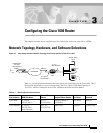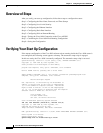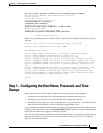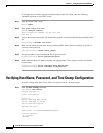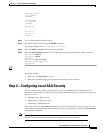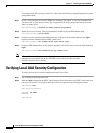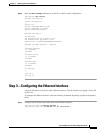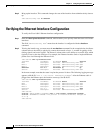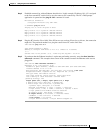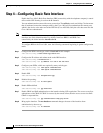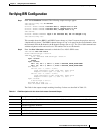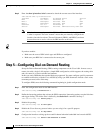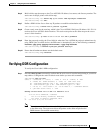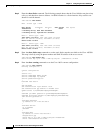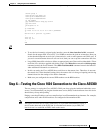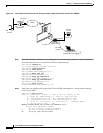
3-3
Cisco IOS Dial Services Quick Configuration Guide
Chapter 3 Configuring the Cisco 1604 Router
Step 1—Configuring the Host Name, Password, and Time Stamps
cisco 1604 (68360) processor (revision C) with 17920K/512K bytes of memory.
Processor board ID 08823977, with hardware revision 00972006
Bridging software.
X.25 software, Version 3.0.0.
Basic Rate ISDN software, Version 1.1.
1 Ethernet/IEEE 802.3 interface(s)
1 ISDN Basic Rate interface(s)
System/IO memory with parity disabled
2048K bytes of DRAM onboard 16384K bytes of DRAM on SIMM
System running from FLASH
8K bytes of non-volatile configuration memory.
12288K bytes of processor board PCMCIA flash (Read ONLY)
--- System Configuration Dialog ---
When you are asked the question, “Would you like to enter the initial configuration dialog? [yes/no]:”,
enter no.
Would you like to enter the initial configuration dialog? [yes/no]: no
Would you like to terminate autoinstall? [yes]: yes
Press RETURN to get started!
00:00:17: %QUICC_ETHER-1-LOSTCARR: Unit 0, lost carrier. Transceiver problem?
00:00:17: %LINK-3-UPDOWN: Interface Ethernet0, changed state to up
00:00:17: %LINK-3-UPDOWN: Interface Serial0, changed state to down
00:00:17: %LINEPROTO-5-UPDOWN: Line protocol on Interface BRI0, changed state todown
00:00:17: %LINEPROTO-5-UPDOWN: Line protocol on Interface BRI0:1, changed state to down
00:00:17: %LINEPROTO-5-UPDOWN: Line protocol on Interface BRI0:2, changed state to down
00:00:17: %LINEPROTO-5-UPDOWN: Line protocol on Interface Ethernet0, changed state to
down
00:00:17: %LINEPROTO-5-UPDOWN: Line protocol on Interface Serial0, changed stat to down
00:00:44: %LINK-5-CHANGED: Interface BRI0, changed state to administratively down
00:00:46: %LINK-5-CHANGED: Interface Serial0, changed state to administratively down
00:00:46: %LINK-5-CHANGED: Interface Ethernet0, changed state to administratively down
00:00:47: %IP-5-WEBINST_KILL: Terminating DNS process
Router>
Step 1—Configuring the Host Name, Password, and Time
Stamps
Assign a host name to the Cisco 1604, enable basic security, and turn on time stamping.
• Assigning a host name helps you to distinguish between different network devices.
• Enabling passwords helps you to prevent unauthorized configuration changes.
• Setting time stamps helps you to trace debug output for testing connections—not knowing exactly
when an event occurs hinders you from examining background processes.
As you configure the software, make sure that all logging dialog generated by the router appears on your
terminal screen. If it does not, enter the terminal monitor EXEC command. If you are configuring the
router with the console port, logging automatically appears.
You can use security measures in addition to those described in Steps 4 and 5 below to further encrypt
the password. See the Cisco IOS Security Configuration Guide and Cisco IOS Security Command
Reference for more information.



